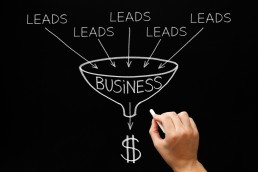What Are Aged Internet Leads and How Can They Help a Business?
In a recent survey of 750 businesses, evidence was found that nearly 60% of business leaders struggle with lead generation.
The struggle to either bring in more leads or they struggle with the funnel process of leads. While this survey is a small sample of businesses, it offers a large glimpse of how difficult lead generation is for businesses around the world.
But the process of getting leads can be a lot easier. It's about targeting and figuring out a strategy that works.
In this article, you'll discover the power of aged internet leads. You'll discover how these leads cost less but also need more cultivation.
Here's everything you need to know about aged internet leads.
What Are Aged Leads?
Depending on the niche, aged leads are often older then real-time leads. They are leads that are often older than 30 days.
Aged leads are often in the range of 30 days to 90 days depending on if you work in real estate or insurance. If you work in another niche, aged leads could be defined as something that's older than 3 days.
The most important thing to remember about aged leads is that they are older than real-time leads.
Aged leads need more cultivation for a number of reasons. These leads may not remember filling out information that may them a lead for a business.
They may have also lost interest in the product since they filled out their information.
That's why it's important to have a strategy in place that can help you cultivate these leads. Remind them why they were interested when you talk to them on the phone or send them an email.
Most importantly, you will have to figure out a strategy to warm them up again as you take them through the sales funnel.
What Are the Benefits of Aged Leads?
One one of the benefits of aged leads is that they are more cost-effective than a real-time lead.
If you are purchasing aged leads, they will be cheaper because they are perceived as being less valuable as real-time leads. They are cheaper because it requires more work to regain their trust and interest.
However, if you can regain that trust and interest, you have a solid chance of turning that lead into a paying customer.
Another benefit of aged leads is that you, the business, are often the only ones contacting that leads after so many days.
With real-time leads, people are bombarded with sales calls and emails for weeks. They are bombarded because they just filled out their information and the sales team is trying to make them a paying customer.
With aged leads, however, you are often the only ones contacting the lead. This is especially true in real estate. If someone fills out information they are interested in a home, there might be multiple real estate agents contacting them.
Yet if you buy aged leads, you are most likely the only person contacting that lead because the other agents have given up on it.
It Takes Extra Work to Cultivate Aged Leads
While there are some benefits to buying aged leads compared to buying real-time leads, it's important to remember the work you will have to put in to cultivate these aged leads.
You will need an effective strategy in place. You will need to warm up these leads especially if they now have cold-feet.
One effective strategy to have in place is email. You should consider emailing these leads and beginning a conversation. Avoid selling anything in the beginning.
These old leads need communication. They need someone to remind them of why they were interested in your product without sounding like someone is trying to sell to them.
You can put all of your old leads on an email list and send weekly emails that tell stories about customers who left and came back.
Know Who You're Targeting
The final strategy to know with aged leads is to remember who your targeting.
The more information you know about your target audience the better. For instance, you may have to classify your core audience into two groups:
- Real-time leads
- Aged leads
When you classify it that way, you can start breaking it down further. You can break it down by interest and behavior. You can see how they are different from each other.
While they may have common interests and problems, it's important to figure out what separated these two groups.
When you can figure out what distinguishes them, you can create stories and content around their needs. You can create a more specific pitch that can convert more of these leads.
The more you know your audience when it comes to behavior and the decision they make, the better you can close these leads.
If you're on the fence about buying leads, you can check out our blog article about the benefits of buying leads for your business. It talks about why buying leads a tremendous investment in your business.
Now You Know How Aged Internet Leads Can Help Your Business
Aged internet leads are an inexpensive way to find leads if you have an effective strategy in place. Your strategy should involve communication without trying to pitch them.
In addition, when you do buy aged leads, you should consider learning why aged leads lost interest in your business. It's a starting point that can begin a meaningful conversation.
If you have questions about strategies around aged leads, you can contact us here.
Expansion Plan: How to Grow Your Business With Sales Leads
Business has changed in the past few years, just like it will change in the future. This is the reality of the world, but few things have changed quite so radically as the importance of sales leads.
And yet, despite their importance, some business owners don't even really know what sales leads are! That's why we've taken the time to explain exactly what sales leads are, why they are important, and how you can use them to grow your business.
Sales Leads: What Exactly Are They?
First and foremost, what exactly are sales leads? To put it simply, a sales lead is an individual or company that is a potential customer for your company.
Leads are one of the earliest stages in the customer retention process. This process, roughly, is followed like so:
Stranger - Visitor - Lead - Customer - Promoter.
As you can see, leads occupy a unique and important position in this model. Leads are people who know you exist, who you communicate with, and who you are working to turn into a paying customer.
Back in the day, you'd generate sales leads by attending networking shows and conferences within your sector. While this is still a valid method, technology has allowed for even more ways of generating sales leads for your business, just like it has transformed advertising.
Before we go into those, we're going to briefly tell you why this is important.
Why Are Sales Leads Important?
Leads are important because they're one of the most reliable ways to generate customers for your business. They serve as a way of linking like-minded people with your business and allowing them to interact with your brand.
They are a better method than just cold-calling. This is because the customer is choosing themselves to be contacted by your business (with a little push on your end).
This makes a customer feel that they are in control of the process and aren't receiving unsolicited adverts from a business.
Leads aren't just vital for converting customers, they're also an excellent way of generating data for your company. This data can then be used to make real business changes and to recognize and solve potential problems.
But though all leads are important, there are different kinds of leads to bear in mind.
Understanding Different Leads
To properly use sales leads to grow your business, you need to know which leads to focus on generating. There are typically four main recognizable leads, as follows:
Information Qualified Lead
An IQL is someone who becomes a lead to learn more about your company. To incentivize these leads you can offer information-based rewards like a catalog, a discount, or a free sample. This is known as a cold lead and, though still important, is the lowest lead option.
Marketing Qualified Lead
An MQL has seen your marketing and is prepared to engage with your business; they just aren't quite ready to become a paying customer yet. These leads will often fill out forms on landing pages for continued information and advertising from your company.
A good way to turn these leads into customers is by using a problem-solving contact form, where your employee can contact them to let them know how your business can help.
Sales Qualified Lead and Product Qualified Lead
SQLs and PQLs are leads that have shown the most interest in your business. The main difference is that PQLs have shown interest in a specific product through a free trial or base version of your software.
A good example of an SQL is someone who has used a contact form on your website to ask a specific question.
Understanding the differences between these leads is vital to maximizing their impact on your business. You will need to use a combination of all of them to operate successful lead generation in your company.
Lead Generation Strategies
Now you know all the basics of lead generation, it's time to learn some strategies to use in implementing your sales leads.
Today, many sales leads are generated through technology. Some popular approaches include emails, social media posts, and blog posts that are then funneled to a landing page. Mobile strategies are also a very popular lead generation tool.
You need to create a designated landing page with a well-made Call to Action (CTA) that will encourage people to become leads. People won't usually do this for the fun of it - there often needs to be an incentive.
Think about things you could offer that could incentivize leads, as this will differ depending on your business. Some reliable options include discount codes or free trials on specific products.
Or, it could include further information on a product or the promise of continued communication with an experienced employee. Think about which kind of lead you're looking to generate, and create an incentive accordingly.
Another popular option for businesses these days is to buy leads. This is a much quicker process for businesses that have a large marketing budget that isn't yet being put to good use.
Buying leads can be a cost-effective way to get started on your lead generation. This is because it allows your company to obtain a large number of leads right off the bat.
You can then dedicate time to transforming these leads into customers.
Where Can I Get Help With Lead Generation?
If you need further assistance with your sales leads generation, you're already in the right place.
As part of our comprehensive data plans, we offer real-time lead deliveries that can funnel leads directly to your company. This can be done on a weekly schedule to ensure you are always receiving new contacts that can turn into customers.
If you're interested in finding out more about how Sales Data Pro can help you, make sure to contact us directly. That way, one of our experienced team members will be on hand to assist you.
Why You Need to Invest in Your Business and Buy Leads
Around 70% of customers say they would be willing to spend more on products from companies that they trust.
But in order to have customers that trust your business, you need leads. You need leads that come through your funnel, are introduced to your business, and become lifelong customers.
But how do you generate leads?
You can either have them come to your business organically, which means they find your business with a blog post, a Google search, a referral, or something else.
Or you can buy leads.
Buying leads offers a lot of benefits that you should consider for your business. It's faster than waiting for leads to come in organically and offers other benefits.
Read this guide on why you need to invest in your business and buy leads.
Buy Leads If You Don't Have a Great Funnel
If you have sales funnel in place for your business and it's not doing as well as you hoped, buying leads is a great solution.
You may not have time to redo your funnel or tweak it. You need leads fast and need them to purchase from your business.
When you buy leads, it gives you time to assess what's wrong with your funnel. You can figure out what part of the funnel, from awareness to action was a weakness.
You can figure out if your funnel needs a better lead magnet, better copywriting, or something else.
It's important to remember that buying leads shouldn't be a long-term solution. It should be a short-term solution to help you figure out what is wrong with your funnel.
The goal should always be to warm up your leads and spread awareness. But in order to reach that point, you need a funnel that is going to be effective.
That's why buying leads while you work on your funnel is an effective short-term solution.
You Have Limited Resources
If your business is in its early stages, you may have limited resources to spend on marketing and your funnel. You may not have an email campaign set up, Facebook ads, Google ads, and more.
All of that can cost a significant amount of money. That's the benefit of buying leads.
Until you have everything up and running with your funnel, you should consider buying leads. As mentioned before, they are a short-term solution.
You can generate profit by buying leads instead of waiting months for your entire funnel and marketing strategy to develop.
You Can Buy Quality Leads
While you may think buying leads doesn't produce quality leads, it actually does. When buying leads, you can specify industry, jobs, location, and more.
Some databases allow you to be as specific as interest. The more specific you are about your target audience, the more likely you'll find people interested in what you're selling.
It offers you an opportunity to have a lifelong customer.
However, it's important that when you buy quality leads, you still have a system for taking them through your sales team. You can't assume they will buy because they are more targeted.
You have to have a master sales system that can help you land these leads into clients. If you want to learn about direct sales marketing and how it can help your sales team, read the blog post here.
You Can Improve Your Sales
Buying leads also gives your sales team a chance to improve their tactics. You can figure out how to respond to leads and how to sell them on your product.
if you buy a bundle of leads, it's an opportunity to figure out your target audience before they start coming organically. It's an opportunity to practice sales calls, figure out what to say that is going to make someone buy your product.
You can also increase your conversion rate on a sales call.
You can do this by having a following-up system with an email or a phone call. Overall, buying leads helps your sales team practice with leads and generate a faster ROI.
A Faster ROI
Buying leads also helps your business generate a faster return on investment. Since most leads you buy arrive instantly, it means you can generate sales immediately.
In addition, you can figure out how much you paid for the leads and how many sales from these leads it would take to generate an ROI.
Saves Time
Finally, it's important to know that buying leads saves time. You don't have to wait for your funnel to be ready. You don't have to wait to have the perfect sales message.
Buying leads is instant and gives an opportunity to generate an ROI right away. The time you save when you are buying leads help you prioritize other parts of your business.
You can focus on lead generation, on the sales team, on a marketing strategy.
Ultimately, collecting data by buying leads can help you improve your business in every area.
Why You Should Buy Leads
Buying leads offer a short-term solution to figuring out your marketing strategy. It gives you time to figure out what part of your funnel you need to improve and how to drive in leads organically.
But buying leads is a way to help promote your business without a working funnel. When you buy leads, they are often quality and can get you a faster ROI.
If you want to see what kind of leads we offer, you can check out our website and see our data packages.
Understanding the Importance of Data Collection for Your Business
The better data you have, the better ROI you'll have for your business. That's why data and analytics are so important to your marketing and sales team for your business.
The importance of data collection is seen in your ROI and how well you know your customers.
It helps you create a strategic marketing plan around the customers. It helps you develop a driving force in sales.
But to achieve those sales, you need to understand the value of data collection.
Here's a guide that can help you see the value of data collection.
You Better Understand Your Market
The more data collected on your audience, the more you know about them that will help you figure out their needs.
With any market, you have to understand their needs. It isn't a good idea to make a guess on what they want in the market. That's why it's important to figure out a specific audience, figure out their problems, and what their needs are.
You can figure out their needs by understanding why data is important for your business.
The data should show demographics, age, location, interest, and perhaps behavior. It should help you figure out if you are targeting male or female.
By understanding this kind of data, you know who to sell to in the market. You know what kind of audience is most likely to buy from your business.
The goal is to improve the customer experience. The data allows you to do that.
The more data you have and what it says about your customer can help you change up your sales calls.
It can help you figure out what the follow-up message should look like and how often you should follow-up. It guides what your sales call script looks like.
If you want to learn more about sales calls, especially retention in your sales calls, read this blog post.
You Know What Marketing Strategies Will Work Best
The data information you have on your target audience will help you create and implement marketing strategies.
The data will help you form email marketing strategies that are more personalized. It speaks to a specific person rather than anybody.
If you were creating a Facebook campaign around your core audience, the data would help you figure out demographics and interest. You would have more success with Facebook ads because you know who you are targeting.
The cost per lead would be lower. The open and click-through rate would be higher. The overall metrics would be better.
More importantly, you know what marketing strategies would work best for your business. It's important because you wouldn't try every marketing strategy available. You would focus on what works best for your core audience.
The data can help you see what strategies your customers respond to best.
You'll see where your audience hangs out. You might notice that they hangout more on Instagram than Facebook.
Overall, you have an idea of what direction to take your marketing campaign because you'll know more about your audience from the data you've collected.
Personalization Is Key
Personalization is becoming more key in marketing and sales. It's why customers buy. They feel connected to the brand and the story it tells.
Personalization helps you tell a story in your emails, your Facebook ads, your Google Ads. It's a story about the customer and their journey.
The more data you have on your audience, the more you can tell a story about them. You can tell a story about how the product helped a customer similar to them.
You can also segment your audience based on their interest. Segmentation allows you to break your audience into more refined groups based on their interest and their choices.
Overall, when you have personalization in your marketing strategy, people feel like you relate to them. They feel like you understand their problems. That's what helps them trust your brand.
That's why data is important to create a personal message around the audience.
Data Is Key in Sales
Lastly, it's important to see how data collection affects sales. It affects how companies reach out to customers.
The sales team can look at the analytics and see how many customers are using mobile vs. desktop, opening email campaigns, clicking on marketing campaigns, and more.
You can also have a better idea of your ROI in sales when you look at data. You can see what customers are purchasing from specific campaigns.
Data can also help you predict sales trends as well as marketing trends. You can see how your audience's behavior shifts when they are shopping on mobile devices.
Data can also help you figure out when to have sales on items and when to launch a product.
Overall, data collection is important for your business because it help your business adapt. It helps your business understand who they are selling to and the problems they have.
Why You Need to Understand the Importance of Data Collection
You need to understand the importance of data collection because it helps you refine your audience and deliver a more specific marketing strategy. It helps your sales team understand who they are talking to and what their problems are.
More importantly, data collection helps shape your business because your business is designed for the customer. Your aim should be to help them, and you can help them by understanding them more.
If you want help with data collection, you can contact us here.
Your Honest Guide to Selling Health Insurance
Health insurance is an undeniably lucrative field based on the percentage of people in the U.S. with insurance, but it can often be a delicate sector to generate sales from. You are generally always taught to push for that hard sell and to maximize your revenue, but with selling health insurance you will need to adapt and change your instinctual sales approach.
Correctly conducting yourself is critical to your success in this industry. By flexibly responding to the concerns of your potential client, whilst harnessing effective listening and empathy skills you will be able to clinch those deals in no time.
So whether you are new to the game of selling health insurance or feel like you need a bit of a refresher, read our comprehensive guide on how to get the most success out of selling health insurance.
First Mistake: It's Not All About You
We can all be a bit guilty of this. We all know our sales patter inside out, we want to conduct a great pitch and cement a successful deal, but it might come across as slightly clinical and false.
People are hardened to sales pitches these days. It's not about showing off, using technical jargon, and demonstrating your intelligence. If anything that type of behavior can have an extremely negative effect on your client relationship.
They don't want someone they feel intimidated by. They want someone they can converse with and relate to.
By taking a step back and listening to what the client has to say, this allows the connection to be developed. You must be actively responding to the needs and whims of the client through the pitch. This is where the trust is built and the deals are made.
Compassion and Empathy Are Your Tools
Understand your client may have a story to tell. This story might be upsetting or traumatic to them because of the parameters of health insurance.
Listen and comfort them when necessary, but there is a fine line between compassion and seeming like you are being insincere. Make sure you empathize with their problems and gently attach solutions to their grievances which can be solved through obtaining health insurance.
By determining the client's fears and needs you can spin the negatives into a positive outcome for all parties concerned.
By utilizing these natural emotional responses you will automatically improve the relationships you have with your clients and ensure that trust is maintained.
Selling Health Insurance: What Is the End Goal?
It's an easy mistake to make. You've had a great conversation with a client, you feel like it's been a successful exchange, but you have no idea where to go next?
In short, you've neglected to think about the end goal and what you want to achieve with this relationship. Sales is a process of getting from A to B, but with small incremental steps which are often invisible to everyone else apart from the seller.
Never go into a meeting or phone call without the next logical step on your 'road map' from A to B. Whether it's offering a free 30-minute health consultation or 'I can send those documents for you to look over', always have the next contact point ready for your client to agree to.
Slow Down: It's a Marathon, Not a Sprint!
As confident and adept insurance sellers, it can be tempting to try and rush through the process and pitch, sweeping the potential client up and taking them along for the ride! This is where mistakes and confusion happens.
Having charisma and charm can be beneficial when selling health insurance but it's important to take your time and make sure that everybody is singing from the same hymn sheet. The last thing you want is a client being completely unsure of their policy and agreeing to policies they aren't comfortable with.
Give the client time to make these big decisions. Skilled sales professionals can anticipate the amount of time certain people take to do so. It means that the client is moving through the process at a speed in which they feel is appropriate, which leads to a greater sense of client satisfaction.
Seek out Your Colleagues' Advice
If you are new to the health insurance business or a ten-year seasoned pro, everybody can always improve on their sales pitch.
People who are unwilling to respond to constructive criticism or feedback are usually more likely to become stagnant or unhappy in their careers further along. By being resistant to change means you often get left behind in the sales world.
Test out your skills on a colleague and have fun with it. Get them to react differently and unusually to your pitches and see how you can overcome their reactions in a positive way.
Sit down and analyze your approach together. Take on board and implement any advice they give you which seems helpful. You can even do the same for them, making it mutually beneficial for both your pitches.
It's also a great way to build better working relationships with your colleagues. Having a strong, supportive network around you at work fosters a more successful environment for everyone.
Where Can I Find out More About Selling Health Insurance?
We hope this article has given you a confidence boost on how to go about selling health insurance regardless of where you are in your sales business journey.
By putting effort and time into growing your client relationships, removing the jargon, and simplifying the process for your clients you can be sure to have a fantastic sales record in no time.
If you have any further queries or questions about selling health insurance or any other services we offer, please don't hesitate to contact us. We'll let you know exactly how we can help you with selling health insurance in the future.
At Last, the 7 Secret on How to Be Successful in Direct Sales Is Revealed
The thrill of seeing large sums of money flowing into your bank account keeps you going each day in the direct sales world. There's no question you have the drive.
The question is, do you have the know-how to go with it? In other words, are you wasting each day simply because you don't know how to maximize your sales opportunities?
Fortunately, it is indeed possible to become a superstar in direct sales. Here are seven amazing secrets on how to be successful in direct sales in 2020.
Let's get started!
1. Identify the Target Market
One of the most important steps you need to take in direct sales this spring is to determine who your services' or products' best buyers are.
In many direct sales firms, your trainers will have you start by listing 100 individuals you know. Although you may certainly find some new business partners or customers in your list, it is best to simply pinpoint who your best potential buyers are from the start.
If you identify your offerings' target buyers, you'll avoid wasting energy and time on people who honestly aren't into what you are offering.
2. Pinpoint Your Value Proposition
In addition to identifying who will likely purchase your offerings, be sure to also identify how they benefit from using your offerings.
For instance, maybe your products will help your customers to feel more energetic. Or, maybe your service will enable them to feel more self-assured.
Reframe your offering's most outstanding features into benefits that your prospective buyers are looking for. This is the best way for you to make sale after sale.
3. Make Daily Contacts
Another important step for any serious direct salesperson is to constantly contact potential customers. In fact, a good goal is to make five contacts each day.
Yes, you are already very busy. We get it. But the key to your success is keeping your calendar full.
The more you allow gaps to develop in your bookings, the more challenging it will be for you to maintain your sales momentum long term.
4. Be Respectful of the Client's Time
When you interact with clients, try to treat their time as a precious commodity. After all, the time you take from them is time they'll never get back.
As a general rule of thumb, people appreciate directness and brevity. So, when you're speaking with your potential customer, be friendly, but keep them focused.
Also, pre-plan the items you will go over with them. This will help you to stay on track during your entire conversation with them.
5. Be Different
Ask yourself this question: "Why should a customer purchase X from me instead of another direct sales representative down the street?"
It is critical that you differentiate yourself from your competition. What makes you stand out?
An excellent way to show how you are different is to share a personal story with your prospective buyers. After all, nobody has the story that you do. This means they can't replicate what you're sharing.
If your story resonates with your potential buyers, then these buyers may be motivated to purchase from you versus another representative.
Another way to make yourself stand out is to offer a greater level of customer service to your clients. You could even also offer an enticing loyalty program for repeat clients.
Furthermore, consider customizing your offering, if possible. You may also want to create your own online site to showcase your personality. Even an advice-filled newsletter that you send out to clients via email can make you hard to forget in the client's mind.
6. Follow Up with Clients
Yet another way to be a direct sales superstar is to remember to follow up with your clients.
Specifically, create a system that will allow you to easily keep in contact with clients and prospects.
Unfortunately, many direct sales representatives are ready to give up once they receive a "no." However, when a client says no to an appointment or purchase, it just may not be the best time.
Instead of accepting defeat, try to follow up with them later to see if they may be interested in sitting down with you or buying from you then. When you follow up with clients, you are demonstrating excellent customer service.
7. Use What You Are Selling
Finally, if you are trying to sell a product or service, make sure that you try this offering for yourself, too.
If you are truly excited about what you are selling, your customers will be able to tell. Likewise, they can tell if you're just giving them a company-created spiel.
The more enthusiastic you are about the products you are selling, the easier it will be for you to make the sale every time.
Also, when you use your service or product, this gives you a personal experience with the offering. As a result, you gain firsthand information that you can incorporate into your sales presentations. This enables you to discuss your offering in an accurate and honest manner with possible customers.
How We Can Help You to Master How to Be Successful in Direct Sales
If you're wondering how to be successful in direct sales, we've got you covered with our one-of-a-kind tool for salespeople: Sales Data Pro.
This tool is the most affordable and user-friendly generator of internet leads in real time. You can also receive consumer and business data from our tool. These data can be helpful to use in predictive dialing, telemarketing, and direct mail.
Get in touch with us to learn more about how Sales Data Pro can help you to take your sales successes to a whole new level in 2020 and beyond.
7 Hottest Digital Marketing Trends That Will Define 2020
More than 60% of your customers begin their shopping instances online.
To say that digital marketing is now critical for your survival is an understatement. You need to be present to influence your customer purchase moments. Digital marketing is a useful tool in helping you talk to the right leads at the right time. However, ever-changing, trends in the horizon threaten to affect your strategy.
Here’s a look at the future of digital marketing to help you uncover impactful trends you need to watch out for.
What's Digital Marketing?
For many, digital marketing is about social media and search engine optimization (SEO). The reality is that at this point, digital marketing has dug deep to span over various aspects.
It’s through digital marketing that you promote your brand. Additionally, you can rely on digital marketing to relay your customer experience.
Digital media helps brands manage various types of media to grow their value. These are earned, owned, and paid media.
With earned media, third parties get to share your product or service and, in the process, compliment your brand. You can intercept this organic moment using digital marketing to leverage the goodwill displayed for more brand equity.
On the other side of the street, paid media is you paying to leverage a third-party channel and reach customers. Through digital marketing, you can craft the right strategies that make the most out of your investment.
Owned media refers to the assets your brand takes ownership of, and you can rely on digital marketing to help drum up brand growth using these assets.
The Future of Digital Marketing
To maximize your digital marketing strategy, you need to not only know where it’s been but where it’s going. Let’s examine some exciting trends poised to shape the field in 2020.
1. Experience over Product
Today’s customer is very fluid, and to add to the pain, has a lot more options to substitute you. Therefore, you can’t live focusing your digital marketing on only acquiring customers.
Your approach to digital marketing must now place customer retention at the heart of things. In this pursuit, expect to see a heavier emphasis on customer experience over the direct promotion of products.
As you think through your strategy, you should intentionally focus on developing hands-on customer experiences. These touchpoints will help differentiate your product from the pack, but only if the experiences remain relevant to your customer's core needs.
2. Micro-Moments
A micro-moment is an instance where a customer shows a lot of intent and uses a device to seek to fulfill a need. These needs typically revolve around knowing, going, doing or buying.
Such moments are increasingly becoming common as customers default to the internet to begin their buying journey. A customer will want what they want when they want it, and only the brand that’s delivering on that need will make a sale.
Therefore, more brands will seek to invest in uncovering relevant micro-moments for their customers.
Such investment will be coupled with a higher demand for content that speaks to the customer insights during identifiable micro-moments to make the most of every lead.
3. The Rise of Voice Search
Smart speakers are an already fairly popular device in American homes, and the numbers seem to bear this out.
Statistics show that by 2022, voice shopping will hit a whopping $40 billion from the $2 billion it generates today.
With such an imminent jump in customer expenditure, your digital marketing strategy will need to address voice search.
The key, though, is to understand that you won't be deploying voice search tactics only to remain relevant but also to bolster your brand experience.
4. Visual Search
Along with voice search is visual search that enables customers to upload an image of an item they are looking for and receive specific results.
Such a tool taps into the entrenched power of mobile to turn a customer's smartphone into a search bar.
The appeal to point and shoot if you want to purchase an item is the convenience, and this will only drive the adoption of visual search up.
Consequently, you will need to optimize your digital marketing strategy to position your products right where customers relying on visual search can discover them.
5. Chat Bots
Chatbots are artificial intelligence-driven tools that utilize instant messaging to interact with your clients day or night. Their popularity has shot up so rapidly that by the end of 2020, 85% of customer service will be powered by chatbots.
As more customers come to expect round-the-clock availability of brands to resolve issues, companies will be under pressure to step up their chatbot strategy.
6. Conversational Marketing
As chatbots become more entrenched, clients have begun to realize the value of conversational marketing.
With conversational marketing, you are nurturing a two-way interaction with customers. As they pose queries, you can offer immediate responses in a conversational-style approach to meet your clients on their terms.
Brands should prepare to utilize more conversational marketing as a feedback-driven model that enhances their user experience.
For example, your copy and other marketing material will increasingly have to revolve around fostering a conversational tone.
7. Personalization
Customer data continues to be highly valuable for brands in helping them discern and anticipate their clients’ needs. However, such data can only be of use if you know how to monetize the insights you receive from it.
Personalization is where you use insights gleaned from customer data to offer unique value propositions that speak to a customer's particular needs.
Your digital marketing will have to factor in all areas that personalization can help the brand stand out.
Additionally, you should expect to find it more critical to deploy personalization across your entire universe of digital marketing and not just the regular channels.
Stay Ahead of the Curve
Digital marketing is a mission-critical tool helping you speak to your customers’ purchase decisions. However, technology keeps changing rapidly, which leads to new trends that can rock your strategy. Endeavor always to keep an eye on the future of digital marketing to identify useful ways to pivot your approach.
Sales Data Pro is your go-to- source for high-quality marketing-related data. Talk to us for information backed by constant and consistent monitoring that can enhance your marketing.
9 Reasons Why Working From Home Is the Best Idea in 2020
Do you dread going into your office every day? We've got a solution for you.
Working from home is a vague and foreign concept to most people who were brought up in the pre-digital age. What you may not know, though, is that there are more and more remote employment opportunities out there and we're seeing a serious shift in the mindset of the working public toward working from home.
Today, we're going to tell you why that's a good thing by giving you 8 of the biggest benefits of working remotely. If you've never considered it before, this should plant the seed of it in your mind, if you've been thinking long and hard about it, this might be what puts you over the edge.
It might not be for everyone, but if you're an independent person that revels in the peace and quiet of your home, then you should probably be working there.
1. Your Office Adapts to You
When you work from home, you don't have to go into an office on a regular basis, which leaves you with numerous options. Many people like to set up a home office to do their work, while others like to do it from the couch or at a nearby cafe.
The beauty of it is that your office environment adapts to how you're feeling that day, so if you're tired of sitting at your desk, you can take your laptop and head to a restaurant or coffee shop for a few hours. When you need another change of scenery, head back home and set up there once again.
2. Save Money While Making Money
Because you don't have to perform the daily task of getting up, getting dressed, heading to the bus or getting in your car, and going to work, you don't have the same expenses that you would if you did. Not only are you going to save on gas or bus change, but you'll save on things like food, coffee, and even work clothes.
It might not seem like a huge amount of savings when you're talking about a short drive or a single bus fare to the office, but when you start adding these things up over months and years, it becomes huge.
3. Work-Life Balance
You'll hear a lot of people that work from home talk about the work-life balance. This is essentially how much your work interferes with your ability to live your life, which is a huge problem for many. When your job encroaches on your life in a negative way, it becomes difficult to separate yourself from your job.
In some ways, working from home blurs the line between work and life, but most people appreciate the ability to mix work and pleasure throughout the course of a day. A healthy balance of the two is proven to increase overall happiness and enjoyment of your work.
4. Staying Healthy in Body and Mind
With the balancing of work and life, you'll feel like you have more time to do things that make you happy. Many decide to take on a more active lifestyle, going for runs or to the gym in the middle of the day to blow off some steam. You simply don't have this luxury when you're in the office all day.
You're obligated to be there and when you make your way home at 5 or 6 pm, usually the last thing you want to do is go lift weights for another hour. So, you're more likely to get fit when you work at home, which will also give your mental health a significant boost.
5. Fewer Distractions
You might think that working from home would distract you more than usual, having no one looking over your shoulder and all of your possessions around you. While that may be true for some people (they'll need to work on this aspect), many find it much more distracting to be surrounded by their coworkers all day.
If you're easily distracted by people talking about their work or asking you for help in your office, you'll be delighted to know that you don't have coworkers in your home. We have all the resources available to us now to set up face-to-face meetings and phone calls online with as many people as necessary.
6. The Benefits of Working Remotely for Your Employer
You might also think that your employer would never go for you working from home, but there are a lot of benefits to the employer as well. Because you have more freedom, you're much more likely to be happy about your position at your company and a happy employee is a more productive one.
In addition, having employees working from home allows your employer to downsize the office and save money on things that keep the brick and mortar running.
7. More Time With Family
By removing your morning and nighttime commute from your day, you can spend a lot more time with your loved ones. If you've got a partner and children, you might only end up seeing them first thing in the morning and right before they go to sleep when you have to go to and from the office.
When you're already home, then you get to clock out whenever you need to be there for your family. That means soccer games, dance recitals, and more alone time with your partner.
8. Stress-Free Work Life
The simple fact of the traditional office environment is that people find it stressful. The drab colors, bright lights, and clanking of keyboards can be incredibly depressing for people that are normally outgoing. Not to mention, there are so many interpersonal issues that crop up in the office setting.
Working from home allows you to enjoy a stress-free environment. You can communicate with your bosses and coworkers digitally, checking-in and asking questions whenever you need to, then focus more on what you have to get done.
You'll Never Look Back
There are more benefits of working remotely than we could possibly list here. If we've convinced you of the virtues of working from home here today, then pay us a visit at Sales Data Pro.
Our partner program gives you the opportunity to earn a substantial income in direct sales and by referring our products and services to your network of potential customers. It's all done remotely and it'll change your life.








